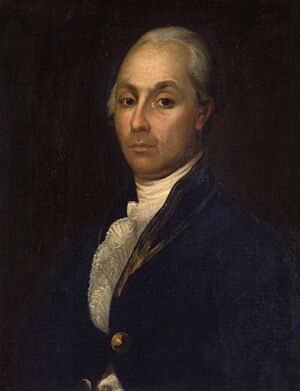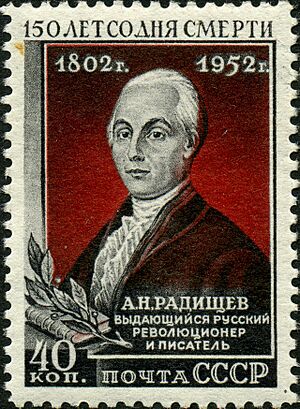Alexander Radishchev facts for kids
Quick facts for kids
Alexander Radishchev
|
|
|---|---|

Earlier than 1790. By unknown author
|
|
| Born | August 31, 1749 Moscow, Russian Empire |
| Died | September 24, 1802 (aged 53) Saint Petersburg, Russian Empire |
| Occupation | Writer |
Alexander Nikolayevich Radishchev (Russian: Алекса́ндр Никола́евич Ради́щев; August 31, 1749 – September 24, 1802) was a Russian writer. He was also a social critic. He became famous for his 1790 book, Journey from St. Petersburg to Moscow. This book talked about the problems in Russia. Because of his writings, he was arrested and sent away. He is known as an important figure in Russian literature.
Contents
Alexander Radishchev's Life Story
Early Life and Education
Alexander Radishchev was born in 1749. His family was a minor noble family. They lived on an estate near Moscow. His father was known for treating his many workers, called serfs, kindly.
When he was 8, Alexander lived on his father's estate. He had a nurse and a tutor. Later, he moved to Moscow. There, he could visit the new Moscow University.
In 1765, he became a page in the court of Catherine the Great. This was a special job. Because he was very smart, Alexander was chosen for a special program. He was sent to study in Germany. He spent several years at the University of Leipzig.
Ideas and Influences
His time studying abroad changed his views on Russian society. He learned about new ideas like natural law and the social contract. These ideas were part of the age of Enlightenment. He hoped to bring these ideas back to Russia.
Alexander worked for Catherine's government. But he also admired revolutionaries like George Washington. He liked the early stages of the French Revolution. He was also inspired by a Russian writer named Nikolay Novikov. Novikov wrote articles that criticized the government. He especially spoke out against serfdom. Serfdom was a system where people were tied to the land and treated like property.
His Famous Book and Exile
Novikov's strong writing inspired Radishchev. Alexander then wrote his most famous book. It was called Journey from St. Petersburg to Moscow. In this book, he wrote about the harsh conditions in Russia. He criticized serfdom and the lack of freedom.
Empress Catherine the Great read his book. She saw his calls for change as dangerous. She ordered all copies of the book to be found and destroyed. Only 17 copies survived out of 650.
In 1790, Radishchev was arrested. He was sentenced to death. He asked Catherine for forgiveness. He even said he didn't support his own book anymore. His sentence was changed. Instead of death, he was sent to Siberia. This was a very cold and distant place.
Life in Siberia and Return
On his way to Siberia, Alexander was treated like a prisoner. He was chained and suffered from the cold. A friend, Count Alexander Vorontsov, helped him. He got better conditions for Alexander.
Alexander's journey to Siberia took two years. He stopped in several towns. He reached Ilimsk in 1792. He lived there for five years. He was the only educated person in the area. He became the local doctor and helped many people.
While in Siberia, he wrote a long book. It was called On Man, His Mortality, His Immortality. This book explored ideas about life and the human soul.
After Catherine died in 1796, the new Tsar Paul called Radishchev back. He was allowed to live on his own estate. Alexander still tried to push for changes in Russia's government.
When Alexander I became Emperor in 1801, Radishchev got a new job. He was asked to help update Russian laws. This was a dream come true for him. But his time in this job was short. Sadly, in 1802, a very sad Radishchev passed away.
Alexander Radishchev's Lasting Impact
After Alexander's death, his home in Moscow became a meeting place. Other writers who shared his views gathered there. They mourned his passing.
The Russian government tried to stop his book from being published. It was finally printed in 1905. Before that, it was passed around secretly. It was also translated into other languages.
Alexander Pushkin, a famous Russian poet, liked Radishchev's ideas. He even started writing a sequel to Radishchev's book. But he never finished it.
After the revolutions in 1905 and 1917, Radishchev became very popular. He was seen as a hero for change. Even though his ideas were different from Soviet ideas, he was presented as a fighter against unfair rule. He was called a "forefather of Bolshevism."
Alexander Radishchev's Beliefs
Alexander Radishchev was a true student of the Enlightenment. He believed in the freedom of each person. He valued humanism and patriotism. His main ideas included:
- Everyone should be equal before the law.
- People should have the right to a fair trial.
- People should have freedom of religion.
- There should be freedom to publish ideas.
- Serfs should be freed.
- People should have protection against unfair arrest.
- There should be freedom of trade.
Views on Society and Government
When he returned from Leipzig in 1771, he saw a big difference. He compared the free Western countries to Russia's autocracy. An autocracy is a system where one person has all the power.
He believed that everyone should get an education. He thought that educated people would help create a better government. This could be a republic or a parliament.
Radishchev especially hated serfdom. He saw it as unfair and cruel. He believed it allowed people to be exploited. Sadly, under Catherine's rule, serfdom actually grew stronger.
While in Siberia, he thought about economics. He wanted Russia to rely less on serfdom. He also believed in strong domestic production. He thought Russia had enough resources to support itself. He didn't think Russia needed too much international trade.
Criticism of Autocracy
Radishchev called autocracy "most contrary to human nature." He believed it made society unfair. He said that seeking unlimited power was a human flaw. However, he didn't criticize all rulers. He praised Lycurgus, a wise king who promoted equality.
Radishchev did not want a bloody revolution. He hoped for a reforming ruler. This ruler would abolish serfdom. They would also protect the weak and innocent. As a member of the ruling class, he wanted to persuade others to give up some power. He knew that even with more knowledge, there would still be problems.
Religious and Philosophical Views
Radishchev's religious and philosophical ideas were very open-minded for his time. He wrote that human thought comes from higher virtues. He believed that our inborn traits influence us as much as our surroundings.
He also thought that all people share common traits. One of these is the belief in a higher power. He strongly believed in immortality. This belief gave him comfort during hard times.
English translations
- A Journey From St. Petersburg to Moscow, Cambridge: Harvard University Press, 1958. Translated by Leo Wiener. Edited with an introduction and notes by Roderick Page Thaler.
- A Journey From St. Petersburg to Moscow, Columbia University Press, 2020 (The Russian Library). Translated by Andrew Kahn and Irina Reyfman.
See also
Images for kids
 | Aaron Henry |
 | T. R. M. Howard |
 | Jesse Jackson |



